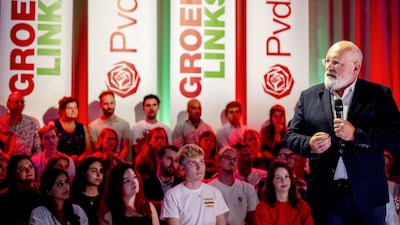Left-wing Dutch politician Frans Timmermans, 62, on Tuesday resigned from a decade-long career as a senior EU official to try to become his country’s new prime minister in an election in November.
The last time he held a job in his government was in 2014, but his long absence from national politics may be to his advantage as he returns home with a reputation as a savvy negotiator who succeeded in bringing in tough climate policies in Brussels.
“He was never seen as a serious candidate to become prime minister,” said Marcel Hanegraaff, associate professor in political science at the University of Amsterdam. “But Europe changed that.”
Two achievements stand out to Mr Timmermans's supporters, particularly the youth: his leading the European Green Deal, a package of policies aimed at making Europe climate neutral by 2050; and his more recent lobbying to have the European Parliament approve a key law to protect nature.
He will be leading a coalition of the Dutch Groenlinks (Greens) and Labour Party (PvdA), which have joined together for the first time in a national election.
Dozens of their members on Tuesday celebrated with Mr Timmermans on his historic nomination.
The event took place in a former cigarette factory that now houses creative and innovative companies in The Hague.
“He is a very effective politician,” said Joey Louws, 21, a student and Labour Party supporter. “If someone can actually make change happen, then I believe it’s him.”
Luc van Alderen, 28, a public relations consultant and a Groenlinks supporter, told The National: “Climate is by far the most important topic among young people right now.
“And with the Green deal, but also the nature restoration law, he did a really good job. It really shows that he is a bridge builder within a really complicated political environment."
Before his departure, Mr Timmermans had been expected to represent the EU at the UN climate negotiations in November at the Cop28 summit in Dubai.
The former European Commission executive vice president in charge of the Green Deal will be temporarily replaced by the commission’s vice president Maros Sefcovic until another Dutch national takes on the job.
“Cop28 is fast approaching, so I hope they’ll make good use of the team I put in place in the commission service,” Mr Timmermans told The National on the sidelines of the event.
“And I hope the member states retain the trust they have in the commission to negotiate on their behalf.”
'Charismatic'
He took questions from the audience for an hour on a wide range of topics, from climate to the war in Ukraine.
Mr Timmermans appeared relaxed, joking with his audience about his reputation for vanity developed during his 2012-2014 tenure as foreign affairs minister, and asking members not to clap for too long or it would inflate his ego.
“We have to ensure that the Netherlands gets its swag back," he said, earning laughter from the audience, many who were young.
"I say that to connect with younger people, but what I mean is that the Netherlands must get its mojo back."
Mr Timmermans said he was aware that this was a “unique chance” for him to become prime minister.
“For many years I hoped for a united left, and suddenly due to circumstances the left now got together,” he said.
Many, including Mr Louws, were charmed.
“He’s very charismatic,” he said of the veteran politician who speaks at least six languages including his native Dutch – English, Italian, French, Russian and German.
Yet Mr Louws recognised that Mr Timmermans still had work to do to build his profile among young Dutch voters.
“He doesn’t have a very public profile among young people, but I think his policies might change that,” he said.
There were no other candidates to lead the joint green-labour ticket.
Groenlinks leader Jesse Klaver is too unpopular among labour supporters and labour leader Attje Kuiken is regarded as not having enough experience, said Mr Hanegraaff.
But the race will be tight. While some polls have shown the green-labour coalition to be in the lead in the past weeks, it is neck to neck with the liberal People’s Party for Freedom and Democracy.
The Farmer-Citizen movement, which led protests against the previous government’s attempts to reduce nitrogen emissions in agriculture, is also a strong contender.
The Dutch nitrogen debate is part of a wider trend among European voters of hostility towards climate policies viewed as unfairly depriving them of their livelihoods.
Mieke, 63, an English school teacher and member of the labour party, said that she hoped Mr Timmermans could extend a hand to voters from the Farmer-Citizen movement.
“I hope that he can get these people on his side,” she said. “We need to unite to tackle environment and social inequality challenges.”
The election race was recently shaken up by the surprise announcement on Sunday by highly popular conservative MP Peter Omtzigt, who said he was launching a new political party.
Yet Mr Omtzigt told local media that he does not want to become prime minister, although he is prepared to join a coalition government.
He is “very conservative” compared to Mr Timmermans, said Mr Hanegraaff, but the leftist leader’s supporters said they foresaw the possibility of the two men working together.
“I think they have a lot of similarities,” said Mieke.
The fragmented political landscape in the Netherlands makes it impossible to form a government without a coalition.
But the prospect of long and difficult negotiations raised questions for Mieke.
“Our country is so polarised,” she told The National.
“What happens when we become the biggest, or nearly the biggest, and we form a coalition with another party? What are we going to stick to … and what are the things we are going to renege on?”
Mieke should receive answers to her questions in early to mid-2024.
On average, forming a Dutch government takes three months. Last time, after an election in 2017, it took a record 225 days.


